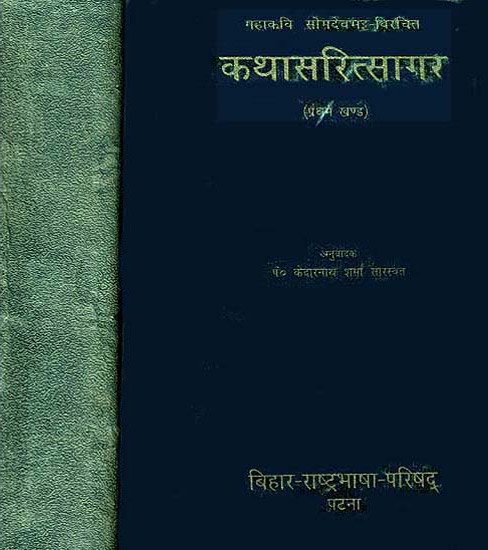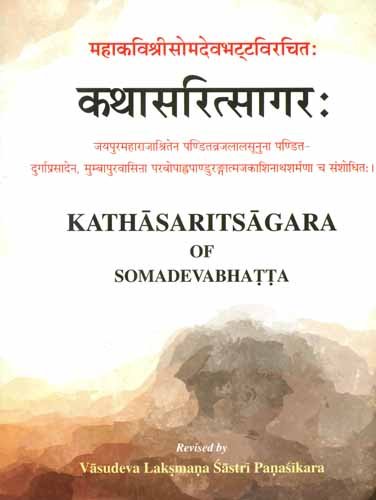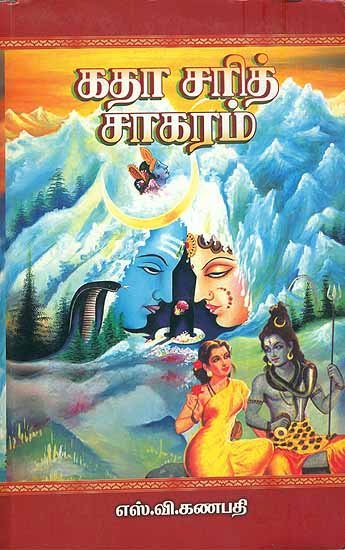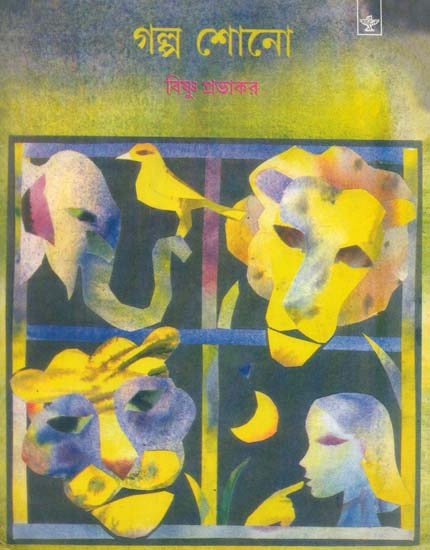Kathasaritsagara [sanskrit]
by C. H. Tawney | 2014 | 226,424 words | ISBN-13: 9789350501351
The Sanskrit edition of the Kathasaritsagara referencing the English translation and grammatical analysis. Written by Somadeva and dating from the 12th century, the Kathasaritsagara (or Katha-sarit-sagara) represents an epic legend narrating the adventures of Naravahanadatta as he strives to become the destined emperor of the Vidyadharas. Alternative titles: (Kathāsaritsāgara, कथासरित्सागर, Kathā-sarit-sāgara)
Verse 12.34.383
ततो ऽत्र यातेषु दिनेषु सद्गुणं प्रजाप्रियं सुन्दरसेनमात्मजम् ।
अवेक्ष्य राज्ये च निवेश्य तं निजे वनं महासेननृपो जगाम सः ॥ ३८२ ॥
tato 'tra yāteṣu dineṣu sadguṇaṃ prajāpriyaṃ sundarasenamātmajam |
avekṣya rājye ca niveśya taṃ nije vanaṃ mahāsenanṛpo jagāma saḥ || 382 ||
The English translation of Kathasaritsagara Verse 12.34.383 is contained in the book The Ocean of Story by C.H. Tawney. This book is available online or you could buy the latest edition:
Read online Buy now! The English translation by C.H. Tawney (2014)
Glossary of Sanskrit terms
Note: This extracts Sanskrit terms and links to English definitions from the glossary, based on an experimental segmentation of verse (12.34.383). Some terms could be superfluous while some might not be mentioned. Click on the word to show English definitions.
Tatah, Tad, Tata, Atra, Yata, Dina, Sadguna, Praja, Apriya, Sundarasena, Atmaja, Avekshya, Rajya, Niveshya, Tap, Nija, Vana, Mahasena, Nripa, Sah,
Analysis of Sanskrit grammar
Note: this is an experimental feature and only shows the first possible analysis of the Sanskrit text (Kathasaritsagara Verse 12.34.383). If the system was successful in segmenting the sentence, you will see of which words it is made up of, generally consisting of Nouns, Pronouns, Verbs, Participles and Indeclinables. Click on the link to show all possible derivations of the word.
- Line 1: “tato 'tra yāteṣu dineṣu sadguṇaṃ prajāpriyaṃ sundarasenamātmajam ”
- tato' -
-
tataḥ (indeclinable adverb)[indeclinable adverb]tataḥ (indeclinable correlative)[indeclinable correlative]tataḥ (indeclinable)[indeclinable]tad (noun, neuter)[ablative single], [ablative dual], [ablative plural]tata (noun, masculine)[nominative single]√tan -> tata (participle, masculine)[nominative single from √tan class 8 verb]sa (noun, masculine)[ablative single], [ablative dual], [ablative plural]sā (noun, feminine)[ablative single], [ablative dual], [ablative plural]
- atra -
-
atra (indeclinable adverb)[indeclinable adverb]atra (noun, masculine)[compound], [vocative single]atra (noun, neuter)[compound], [vocative single]
- yāteṣu -
-
yāta (noun, masculine)[locative plural]yāta (noun, neuter)[locative plural]√yā -> yāta (participle, masculine)[locative plural from √yā class 2 verb]√yā -> yāta (participle, neuter)[locative plural from √yā class 2 verb]
- dineṣu -
-
dina (noun, masculine)[locative plural]dina (noun, neuter)[locative plural]
- sadguṇam -
-
sadguṇa (noun, masculine)[adverb], [accusative single]sadguṇa (noun, neuter)[adverb], [nominative single], [accusative single]sadguṇā (noun, feminine)[adverb]
- prajā -
-
praja (noun, masculine)[compound], [vocative single]praja (noun, neuter)[compound], [vocative single]prajā (noun, feminine)[nominative single]
- apriyam -
-
apriya (noun, masculine)[adverb], [accusative single]apriya (noun, neuter)[adverb], [nominative single], [accusative single]apriyā (noun, feminine)[adverb]
- sundarasenam -
-
sundarasena (noun, masculine)[adverb], [accusative single]
- ātmajam -
-
ātmaja (noun, masculine)[adverb], [accusative single]ātmaja (noun, neuter)[adverb], [nominative single], [accusative single]ātmajā (noun, feminine)[adverb]
- Line 2: “avekṣya rājye ca niveśya taṃ nije vanaṃ mahāsenanṛpo jagāma saḥ ”
- avekṣya -
-
avekṣya (noun, masculine)[compound], [vocative single]avekṣya (noun, neuter)[compound], [vocative single]
- rājye -
-
rājya (noun, masculine)[locative single]rājya (noun, neuter)[nominative dual], [vocative dual], [accusative dual], [locative single]rājyā (noun, feminine)[nominative dual], [vocative single], [vocative dual], [accusative dual]√rāj -> rājya (participle, masculine)[locative single from √rāj class 1 verb], [locative single from √rāj]√rāj -> rājya (participle, neuter)[nominative dual from √rāj class 1 verb], [vocative dual from √rāj class 1 verb], [accusative dual from √rāj class 1 verb], [locative single from √rāj class 1 verb], [nominative dual from √rāj], [vocative dual from √rāj], [accusative dual from √rāj], [locative single from √rāj]√rāj -> rājyā (participle, feminine)[nominative dual from √rāj class 1 verb], [vocative single from √rāj class 1 verb], [vocative dual from √rāj class 1 verb], [accusative dual from √rāj class 1 verb], [nominative dual from √rāj], [vocative single from √rāj], [vocative dual from √rāj], [accusative dual from √rāj]√rāj (verb class 1)[present passive first single]√rāj (verb class 0)[present passive first single]
- ca -
-
ca (indeclinable conjunction)[indeclinable conjunction]ca (noun, masculine)[compound], [vocative single]ca (noun, neuter)[compound], [vocative single]
- niveśya -
-
niveśya (noun, masculine)[compound], [vocative single]niveśya (noun, neuter)[compound], [vocative single]
- tam -
-
ta (noun, masculine)[adverb], [accusative single]ta (noun, neuter)[adverb], [nominative single], [accusative single]tā (noun, feminine)[adverb]tan (noun, masculine)[adverb]tap (noun, masculine)[compound], [adverb], [nominative single], [vocative single]tap (noun, neuter)[compound], [adverb], [nominative single], [vocative single], [accusative single]sa (noun, masculine)[accusative single]
- nije -
-
nija (noun, masculine)[locative single]nija (noun, neuter)[nominative dual], [vocative dual], [accusative dual], [locative single]nijā (noun, feminine)[nominative dual], [vocative single], [vocative dual], [accusative dual]
- vanam -
-
vana (noun, masculine)[adverb], [accusative single]vana (noun, neuter)[adverb], [nominative single], [accusative single]vanā (noun, feminine)[adverb]
- mahāsena -
-
mahāsena (noun, masculine)[compound], [vocative single]mahāsena (noun, neuter)[compound], [vocative single]
- nṛpo* -
-
nṛpa (noun, masculine)[nominative single]
- jagāma -
-
√gā (verb class 3)[imperative active first plural]√gam (verb class 1)[perfect active first single], [perfect active third single]√gam (verb class 2)[perfect active first single], [perfect active third single]√gam (verb class 3)[perfect active first single], [perfect active third single]
- saḥ -
-
saḥ (indeclinable correlative)[indeclinable correlative]sa (noun, masculine)[nominative single]
Other editions:
Also see the following editions of the Sanskrit text or (alternative) English translations of the Kathasaritsagara Verse 12.34.383
Kathasaritsagar
by Kedarnath Sharma Saraswat (2005)
The Only Edition with the Sanskrit Text and its Hindi Translation (An Old and Rare Book) Set of 3 Vol.
Buy now!
Kathasaritsagara of Somadeva Bhatta (Sanskrit Text Only)
by Vasudeva Laksmana Sastri (2013)
Katha Sarit Sagar in Marathi
by H. A Bhave (1995)
Set of 5 Volumes; Published by Varada Books, Pune. 2256 pages (Throughout B/W Illustrations).
Buy now!
Katha Sarit Sagara (Tamil)
by S. V. Ganapati (எஸ். வி. கணபதி) (2014)
[கதா சரித் சாகரம்] Published by Alliance Publications.
Buy now!
Galpa Shono
by Abhijit Chattopadhyay (2014)
[গল্প শোনো] Galpa Shono: Bengali Translation of 'Suno Kahani From Katha Sarit Sagar'; 9788126015436; Published by Sahitya Akademi, Delhi.
Buy now!Preview of verse 12.34.383 in Bengali sript:
ততো ঽত্র যাতেষু দিনেষু সদ্গুণং প্রজাপ্রিযং সুন্দরসেনমাত্মজম্ ।
অবেক্ষ্য রাজ্যে চ নিবেশ্য তং নিজে বনং মহাসেননৃপো জগাম সঃ ॥ ৩৮২ ॥
![Kathasaritsagara [sanskrit] - book cover](/uploads/a/Katha-Sarit-Sagara.jpg)




